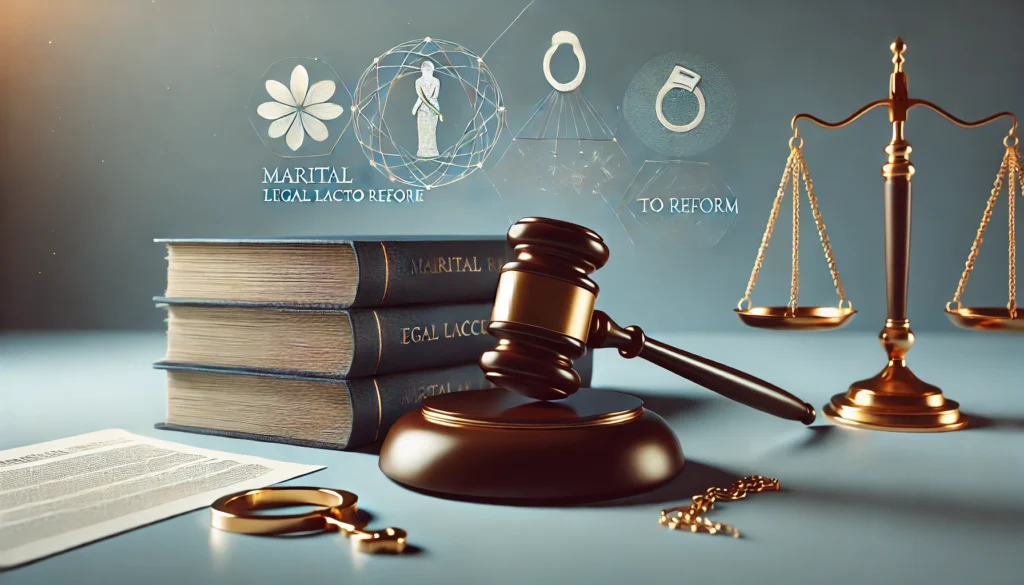Published On: 20th August, 2024
Authored By: Samriddhi Tiwari
Atal Bihari Vajpayee School of Legal Studies, CSJM University
INTRODUCTION
Marriage is a sacred bond between husband and wife which is also a basis of society and is considered the basic unity of family. However, the marriage laws in India have always been a victim of religious conservatism and rigidness. The religious laws have led to gender disparity and widespread discrimination on various levels. These laws have ingrained patriarchal mindset and tend to ignore the plight of other genders hence, uniformity in civil laws has been a need of every democratic, secular and pragmatic nation but it’s disheartening to note that though India is the world’s biggest democracy, it still lacks a uniform civil law that can bind all the positive aspects of every religious law and can still be scientific in its appeal. Britishers had made various reforms in the criminal justice however, they purposely ignored civil laws so as to suit their selfish motives of divide and rule. After Independence, copious jurists and political thinkers suggested a uniform law but the religious politics in India and the communal approach have always served as a barrier to this much-needed reform.
The Indian Judicial system has been a witness to several landmark cases and judgments which have not only served justice for the present but have also been a beacon of light for future generations to come. One such judgement which paved a path for Muslim women to get maintenance after the iddat period and also rejuvenated the debate for the Uniform Civil Code was Mohd. Ahmad Khan V.Shahbano Begum,1985. In the below-mentioned article, we will discuss the intricacies of this case and how the legislation at that time had tried to sabotage the justice given by the judiciary for their personal religious politics.
Facts
- In 1932, Mohd. Ahmad Khan(Appellant) who was a well-known lawyer of Indore had married Shah Bano Begum (Respondent ).In the 14 years of their marriage, they both became parents to 5 children.
- In 1946, the appellant got married for the 2nd time to Halima Begum.
- In 1975, Shahbano Begum was thrown out of the house by her husband Ahmad Khan and was promised 200 /- per month as monthly maintenance.
- However, after a few months the appellant stopped giving maintenance to his then-lawful wife Shah Bano(respondent) who was 62 years old at that time and was incapable of earning a livelihood by herself.
- In 1978, Shahbano Bano initiated legal proceedings under section 125 of CRPC[1] and demanded 500/- as a monthly allowance.
- On 6th November 1978, Mohd. Ahmad Khan gave an irrevocable talaq to Shahbano Begum.
- Mohd Ahmad Khan also deposited 3000/- as Mehernama amount.
- In August 1979, the Lower Court of Indore ordered Mohd. Ahmad Khan is to give 25/-per month to Shah Bano as a monthly allowance.
- On 1st July 1980, the High Court ordered Khan to provide 179.20/- per month as a monthly allowance to his ex-wife Shah Bano.
- Ahmad Khan who was not satisfied with the High Court’s verdict filed a special leave petition at the Supreme Court of India.
ISSUE RAISED
When this case went to the Supreme Court, there were certain issues that became the orbit around which the whole discussion revolved. These issues were as follows:
- there is a contradiction between section 125 of CRPC and Muslim personal law regarding a wife’s right to maintenance or not?
- Whether Muslim women come under the orbit of section 125 of CRPC or not?
- Does Muslim personal law impose any liability upon the husband to provide maintenance to his estranged wife after the completion of the iddat period or after submitting the amount?
CONTENTION OF THE PARTIES
Appellant side :
Mohd. Ahmad Khan presented the argument that as he and his ex-wife are practising Muslims hence, their matter is to be dealt with under the Muslim Personal Law (Shariat) Application Act, 1937. He further stated that as he not only provided 200/-per month for 2 years but also gave 3000/- ( amount) therefore, he is not liable to provide any further allowance to his ex-wife Shah Bano. He further argued the law under section 125 of CRPC is not applicable to Muslims as it contradicts the Sharia law which states that a husband is liable for maintenance amount only till the iddat period. (Iddat is a period of 89 days or three lunar months where a widow or divorced woman has to live in seclusion and cannot remarry)The contention given by the appellant was also supported by the Muslim Personal Law Board. Ahmad Khan also used section 127 of CRPC which states certain exceptions to section 125.Section 127(3)(b)[2]talks about how courts can cancel the suit for maintenance of any woman who has already been provided maintenance under any personal law.
Respondent side :
Shah Bano Begum argued that she was entitled to receive an allowance from her ex-husband under section 125 of CRPC,1973. According to this section every woman who is unable to maintain herself is entitled to receive maintenance from her husband. The respondents relied on the case of Bai Tahira v. Ali Hussain Fidalli Chothia (1979) and Fazlunbi v. K. Khader Vali (1980) in which the court had favoured the rights of Muslim women to get maintenance under section 125.[3] It was stated that section 125 is mentioned under the Code of Criminal Procedure and not under the Code of Civil Procedure and as criminal laws are uniform in nature therefore, it was equivalent for every citizen whether he or she belongs to any religion. Therefore, it was stated that as section 125 is secular in its approach and Shah Bano is a citizen of this country hence, she should be given all the rights that are mentioned in this law.
PROCEEDINGS OF THE CASE
The proceedings of the case were handled by a 5 judges bench which included Chief Justice Y.Chandrachud, Rangnath Misra, D.A Desai, O.Chinappa Reddy, and E.S Venkataramiah. On 23rd April 1985, the Supreme Court unanimously agreed to the decision made by the High Court.
OBSERVATIONS OF THE COURT
Ratio Decidendi:
- The honourable Supreme Court of India held that section 125 of CRPC was secular in its approach and applied to each and every citizen no matter what their religious preference was as CRPC is a criminal law which is uniform in its nature.
- The honourable court held that as Muslim marriages are a form of contract, therefore, the amount given in is a consideration and not an amount of maintenance. Also, Mehr is a symbol of respect and doesn’t satisfy the criteria for allowance given after divorce hence, the appellant was asked to fulfil his obligations of paying maintenance after divorce.
- The court stated that there is no contradiction between section 125 of CRPC and Muslim personal law.
- It was decided that section 125 talks about conditions where a woman is incapable of maintaining herself and it has nothing to do with the iddat period; however, if a woman is capable of sustaining herself then the provision of the iddat period is applied.
- The court also used Ayats from the holy Quran to back up its claim of providing maintenance in addition to.
AFTER THE EFFECTS OF JUDGMENTS
The decision was highly criticised by the Muslim Personal Law Board and other Muslim groups on the grounds that the court had no right to intervene with the Sharia laws and these family matters are bound to be covered under personal laws which vary from religion to religion. The decision caused a lot of controversy and outrage all over the country. The then Rajiv Gandhi government was tense about the impacts of judgement on upcoming elections hence, they brought up the Muslim Women (Protection of Rights on Divorce) Act, 1986 which automatically nullified the impacts of the judgement. This interference of legislation in the judiciary was directly violative of the ideals of checks and balances.
CONCLUSION
The case rejuvenated the debate about UCC and its need in the present set-up.UCC talks about a single national law regarding marriage, divorce and inheritance. It aims to replace all religious laws with a uniform law that is pragmatic and just in nature.UCC is important to establish unity in diversity in a real sense and for providing equal opportunities, justice, social and moral protection and gender parity to every citizen.
Therefore, UCC is a need of the hour and a country like India should definitely work on bringing uniformity in civil laws so as to protect the slogan of unity in diversity in its true letter and spirit.
Reference(s):
[1] (1) If any person having sufficient means neglects or refuses to maintain–
(a) his wife, unable to maintain herself, or
(b) his legitimate or illegitimate minor child, whether married or not, unable to maintain itself, or
(c) his legitimate or illegitimate child (not being a married daughter) who has attained majority, where such child is, by reason of any physical or mental abnormality or injury unable to maintain itself, or
(d) his father or mother, unable to maintain himself or herself,
a Magistrate of the first class may, upon proof of such neglect or refusal, order such person to make a monthly allowance for the maintenance of his wife or such child, father or mother, at such monthly rate as such Magistrate thinks fit and to pay the same to such person as the Magistrate may from time to time direct:
[2] Where any order has been made under section 125 in favour of a woman who has been divorced by or has obtained a divorce from her husband, the Magistrate shall, if he is satisfied that -(a)the woman has, after the date of such divorce, re-married, cancel such order as from the date of her re-marriage;(b)the woman has been divorced by her husband and that she has received, whether before or after the date of the said order, the whole of the sum which, under any customary or personal law applicable to the parties, was payable on such divorce, cancel such order -i)in the case where such sum was paid before such order, from the date on which such order was made;(ii)in any other case, from the date of expiry of the period, if any, for which maintenance has been actually paid by the husband to the woman;
[3] IPLEADERS.IN,https://blog.ipleaders.in/shah-bano-case/(July 11,2024)



